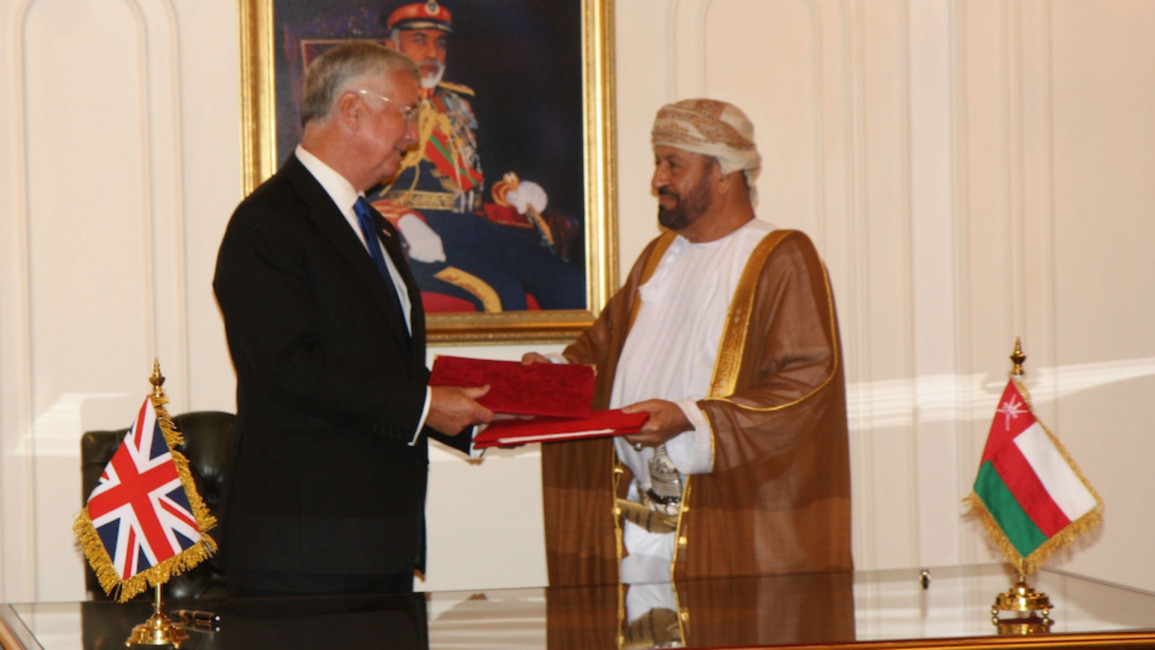UK secures use of Oman naval base in Duqm
UK secures use of Oman naval base in Duqm
UK Defence Minister Michael Fallon visited Oman to cement a raft of military agreements with the sultanate, including the use of Duqm port for naval ships.
2 min read
Defence Ministers Fallon and Busaidi signed a raft of agreements [FCO]
UK Foreign Minister Michael Fallon cemented a raft of military agreements with Oman this week, including the use of an Arabian Sea port for British naval ships.
Fallon visited the sultanate on Monday to sign agreements with his counterpart and strengthen the already close military ties between the two countries.
A memorandum of understanding was signed between the two defence ministers to allow British naval ships to the use facilities at Duqm port before the establishment of the UK Joint Logistics Support Base.
"This agreement ensures British engineering expertise will be involved in developing Duqm as a strategic port for the Middle East, benefiting the Royal Navy and others," Fallon said.
"Oman is a longstanding British ally and we work closely across diplomatic, economic and security matters. Our commitment to the Duqm port project highlights the strength of our relationship."
Among the craft that will be allowed to dock in Duqm is the HMS Queen Elizabeth aircraft carrier, the largest ship in the British navy.
From Duqm, the supercarrier will be able to "project influence across an important region" the UK foreign office said.
The Joint Logistics Support Base will give the UK a "permanent" military presence in Oman, serving as a naval base, training facility, and key logistics centre, the foreign office said on its website.
Also finalised were joint exercises between the two countries, including "Saif Sareea 3" due to take place next year in Duqm.
Oman and the UK have some of the strongest military relations in the Gulf, strengthened after Sultan Qaboos bin Said took to the throne in 1970.
The UK was a key ally in the sultan's war against communist separatists in the south of the country.
British military officers have traditionally trained the Omani armed forces, while the UK has been a notable arms supplier including the sale of 12 Typhoon "Eurofighters" with the first jets delivered in May.
Fallon visited the sultanate on Monday to sign agreements with his counterpart and strengthen the already close military ties between the two countries.
A memorandum of understanding was signed between the two defence ministers to allow British naval ships to the use facilities at Duqm port before the establishment of the UK Joint Logistics Support Base.
"This agreement ensures British engineering expertise will be involved in developing Duqm as a strategic port for the Middle East, benefiting the Royal Navy and others," Fallon said.
"Oman is a longstanding British ally and we work closely across diplomatic, economic and security matters. Our commitment to the Duqm port project highlights the strength of our relationship."
Among the craft that will be allowed to dock in Duqm is the HMS Queen Elizabeth aircraft carrier, the largest ship in the British navy.
From Duqm, the supercarrier will be able to "project influence across an important region" the UK foreign office said.
The Joint Logistics Support Base will give the UK a "permanent" military presence in Oman, serving as a naval base, training facility, and key logistics centre, the foreign office said on its website.
Also finalised were joint exercises between the two countries, including "Saif Sareea 3" due to take place next year in Duqm.
Oman and the UK have some of the strongest military relations in the Gulf, strengthened after Sultan Qaboos bin Said took to the throne in 1970.
The UK was a key ally in the sultan's war against communist separatists in the south of the country.
British military officers have traditionally trained the Omani armed forces, while the UK has been a notable arms supplier including the sale of 12 Typhoon "Eurofighters" with the first jets delivered in May.

![Trump's warm greeting to Netanyahu contrasted with Kamala Harris's critical reception [Getty]](/sites/default/files/styles/image_212x120/public/2024-07/GettyImages-2162908988.jpg?h=69f2b9d0&itok=uRh_9WXh)
![The brutal assault on Khan Younis has killed dozens and displaced thousands more [Getty]](/sites/default/files/styles/image_330x185/public/2024-07/GettyImages-2162526709.jpg?h=d3eda8cf&itok=n5N-o8p5)
![Members of the Algerian delegation threw roses into the Seine [Getty]](/sites/default/files/styles/image_330x185/public/2024-07/GettyImages-2162980872.jpg?h=199d8c1f&itok=h_3o_TOL)